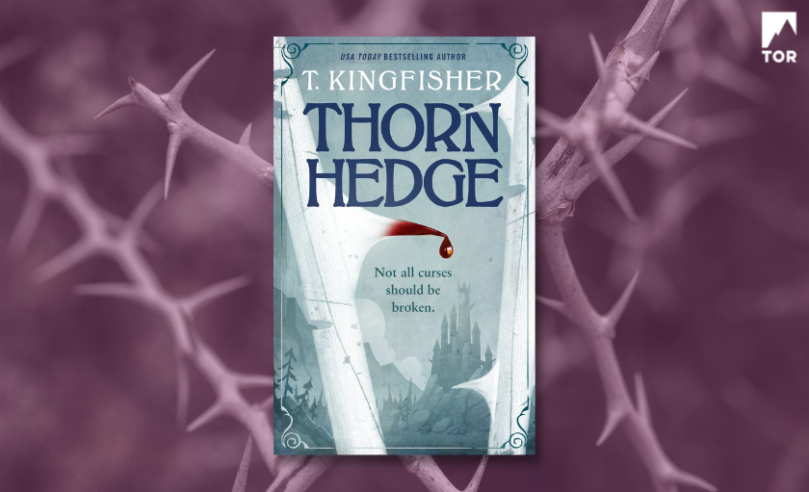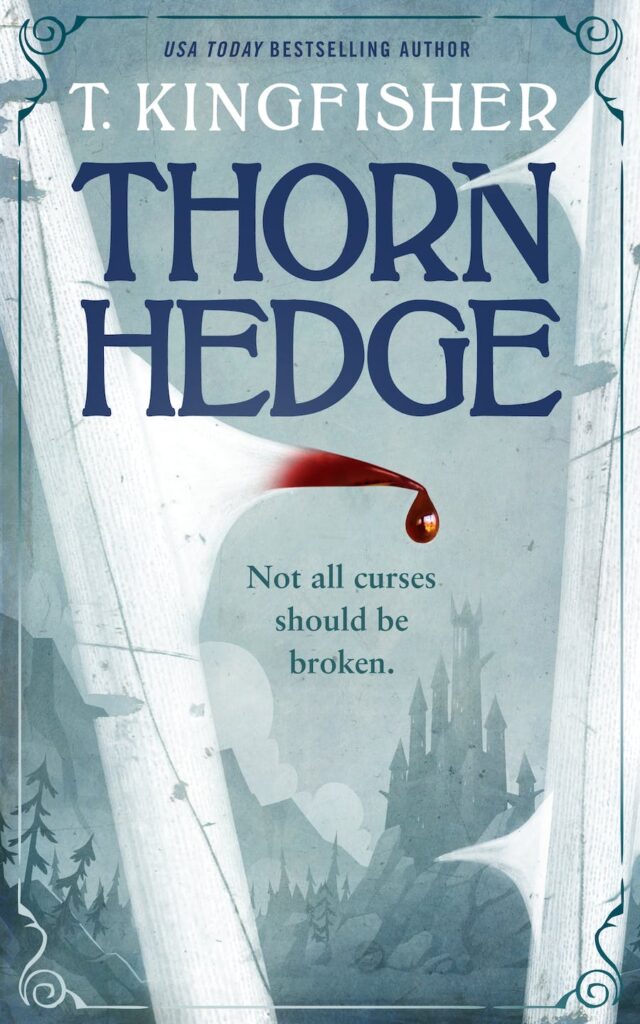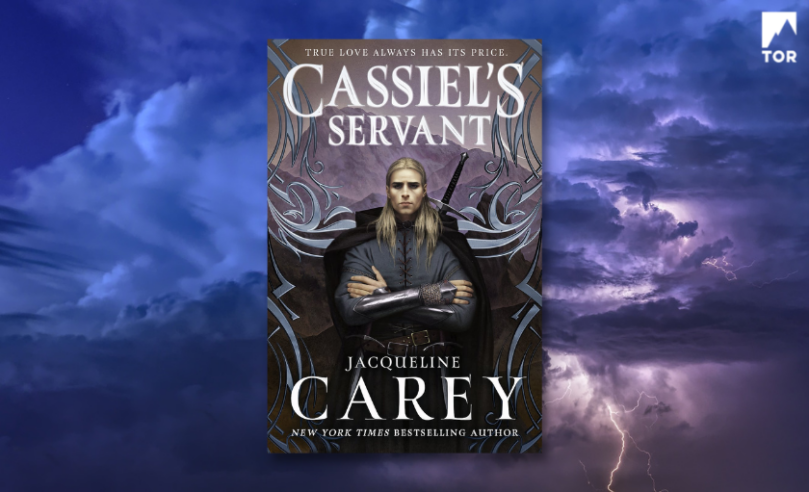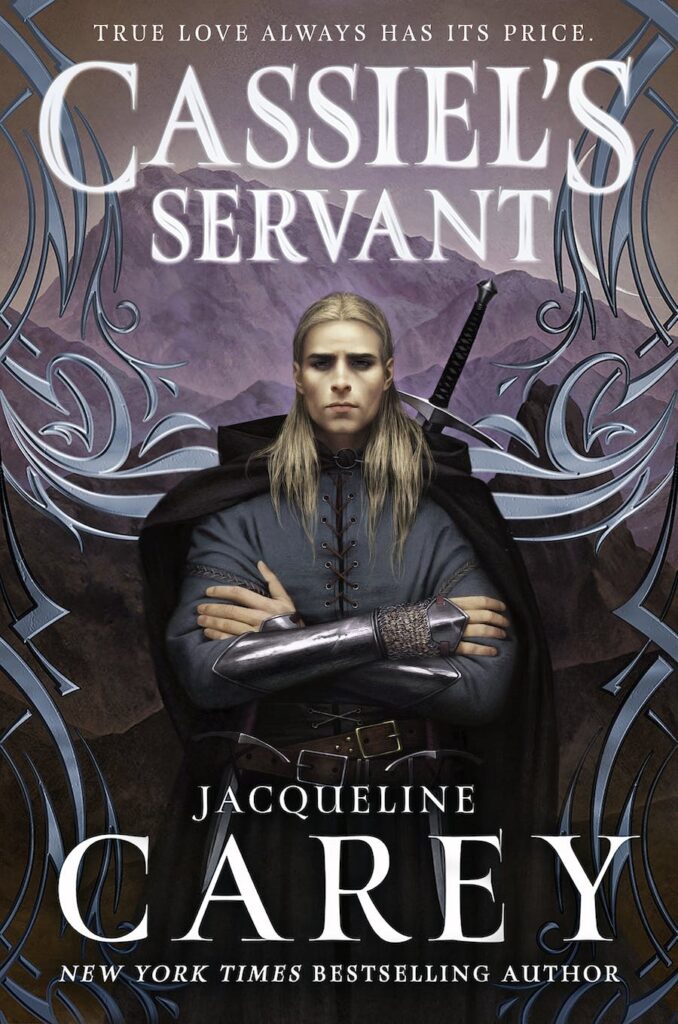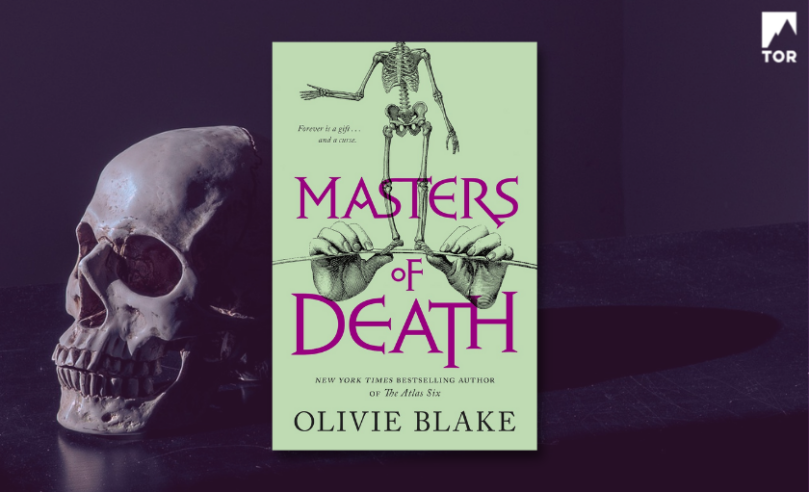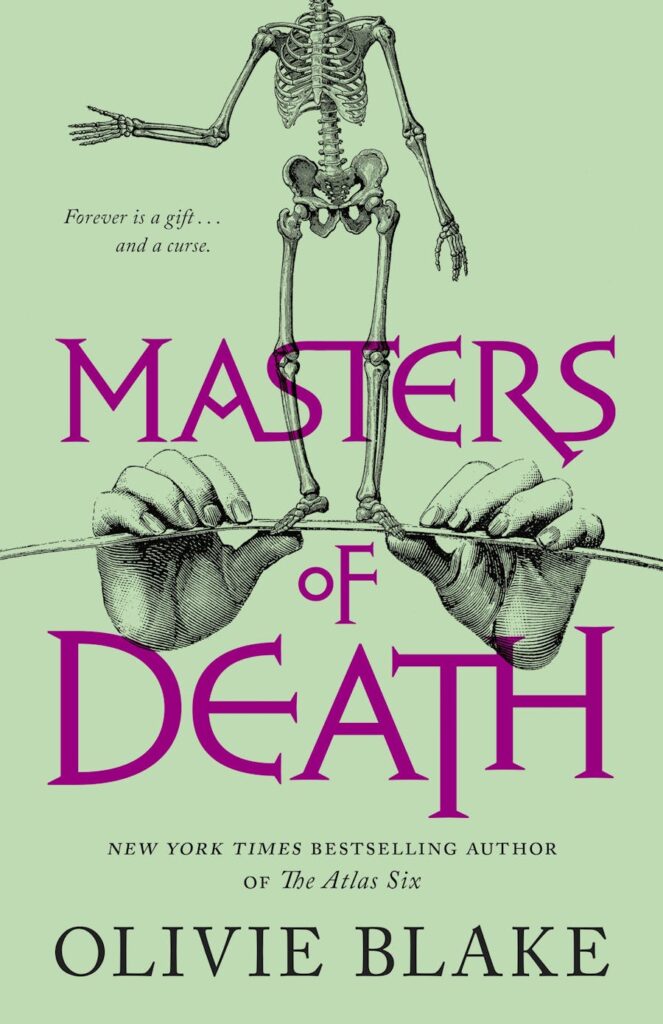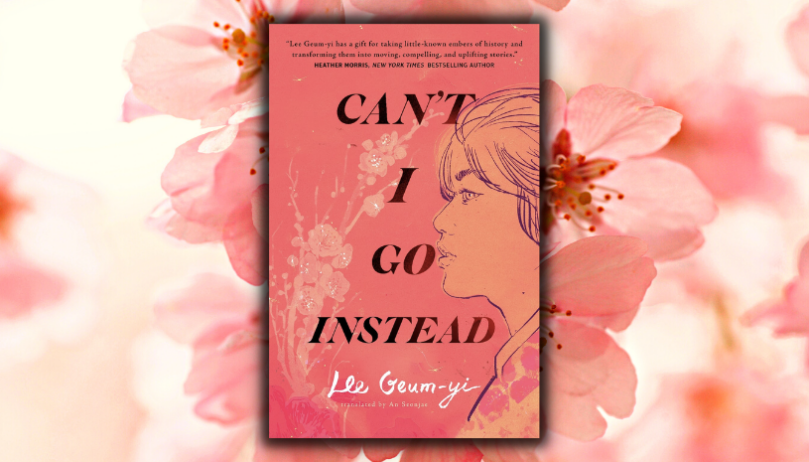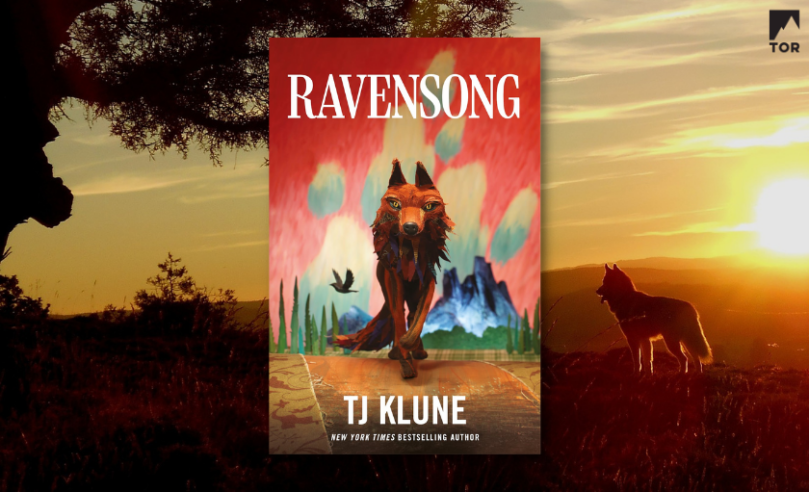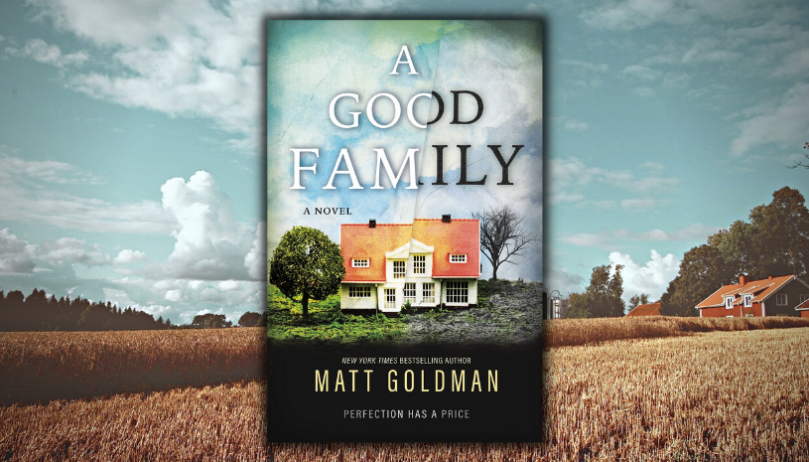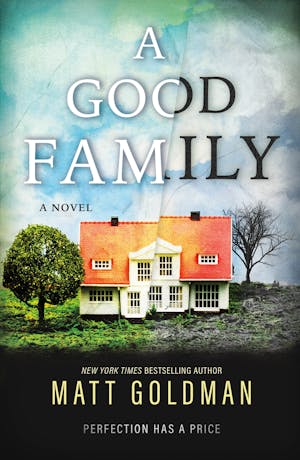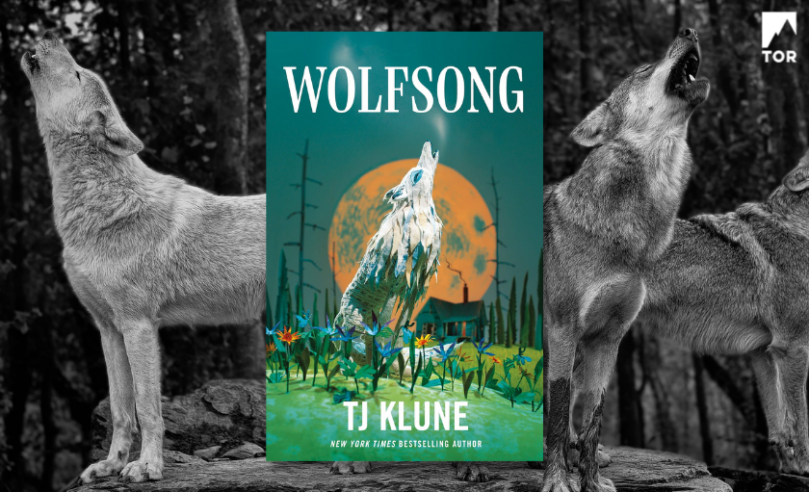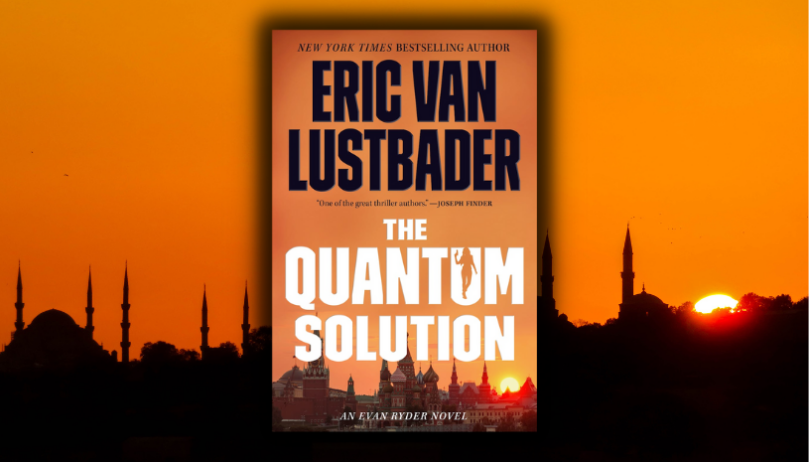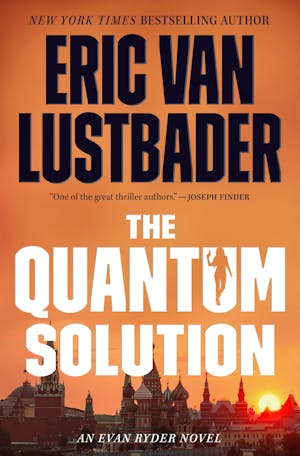From USA Today bestselling author T. Kingfisher, Thornhedge is the tale of a kind-hearted, toad-shaped heroine, a gentle knight, and a mission gone completely sideways.
A very special hardcover edition, featuring foil stamp on the casing and custom endpapers illustrated by the author.
There’s a princess trapped in a tower. This isn’t her story.
Meet Toadling. On the day of her birth, she was stolen from her family by the fairies, but she grew up safe and loved in the warm waters of faerieland. Once an adult though, the fae ask a favor of Toadling: return to the human world and offer a blessing of protection to a newborn child. Simple, right?
But nothing with fairies is ever simple.
Centuries later, a knight approaches a towering wall of brambles, where the thorns are as thick as your arm and as sharp as swords. He’s heard there’s a curse here that needs breaking, but it’s a curse Toadling will do anything to uphold…
Please enjoy this free excerpt of Thornhedge by T. Kingfisher, on sale 8/15/23
Chapter 1
In the early days, the wall of thorns had been distressingly obvious. There was simply no way to hide a hedge with thorns like sword blades and stems as thick as a man’s thigh. A wall like that invited curiosity and with curiosity came axes, and it was all the fairy could do to keep some of those curious folk from gaining entrance to the tower.
Eventually, though, the brambles had grown up around the edges—blackberry and briar and dog rose, all the weedy opportunists—and that softened the edge of the thorn wall and gave the fairy some breathing room. Roving princes and penniless younger sons had been fascinated by the thorns, which were so obviously there to keep people out. Hardly anybody was interested in a bramble thicket.
It helped, too, that the land around the thorns became inhospitable. It was nothing so obvious as a desert, but wells ran dry practically as soon as they had been dug, and rain passed through the soil as if it were sand instead of loam. That was the fairy’s doing, too, though she regretted the necessity.
The fairy was the greenish-tan color of mushroom stems and her skin bruised blue-black, like mushroom flesh. She had a broad, frog-like face and waterweed hair. She was neither beautiful nor made of malice, as many of the Fair Folk are said to be.
Mostly she was fretful and often tired.
“How do they know?” she asked miserably. “Everyone who knew her should be dead of old age by now—them and their children, too! Their grandchildren should be gray-haired. How do they even remember there’s a tower here?”
She was talking, more or less, to a white wagtail, a little bird that liked short grass and pumped its tail constantly as it walked. Wagtails were not so clever as rooks or jackdaws or carrion crows, but the fairy liked them. They did not make fun of her like the crows would, nor carry tales the way that the rooks did.
The wagtail scurried closer, pumping its tail up and down.
“They must be telling stories,” said the fairy hopelessly. “About a princess in a tower and a hedge of thorns to keep the princes out.”
She wiped her eyes. She knew that her eyelids were turning blue-black in response to the unshed tears.
There was no one to see her except the wagtail, but she pinched the bridge of her nose and tilted her head back anyway. The old habits were still with her.
“I can’t fight stories,” she whispered, and a few tears, dark as ink, ran down her face and tangled in her hair.
But time did pass and perhaps the stories were told less often. Fewer men came to the thorn hedge with axes. The wagtails left, because they preferred open country, and the fairy was sorry to see them go. Jays moved in, flitting through the thorns and blistering the air with their scolds. They were shy and spooked easily, for all their cursing. The fairy recognized kindred spirits, as she still spooked easily herself.
As the years trickled away and the thorns filled with dog roses, her soul grew easier. There were stones inside her heart that would never stop grinding together, but they did not weigh so heavily in the years when no princes came.
The fairy was filled with dread when she heard the ringing of nearby axes. She crouched in the brambles, toad- shaped, motionless, thinking, What will I do if they come nearer?
But they did not come nearer. They cut a road through the woods but gave the brambles a wide swath. The tower had been built on a rocky hill—a good, defensible place for a castle, but not a good place for a road. The axe bearers cut south instead, in a long curve, over what had once been fields held by the plow.
The fairy was afraid for a long time that the coming of the road would mean the coming of more princes and younger sons, but mostly what it brought were merchants and travelers. None seemed interested in forcing their way through a massive bramble thicket, and perhaps none of them made the connection about how much land the brambles covered, or stopped to wonder what such a dense growth might conceal. She watched the travelers with interest, for those were the only human faces—save one—that she saw. They were so very different, in so many different shapes and colors. Pale, fair-haired men striding down from the north and dark- skinned men in beautiful armor riding in on horses from the east. Men in caravans who looked like the old royal family, serfs and peasants in homespun, the Traveling Folk in their wagons—a great cross section of humanity who would pass one another on the road and nod and sometimes stop and speak in unfamiliar languages.
(One of the few kind gifts given to and by the Fair Folk is the ability to speak any of the languages of the earth. The fairy could understand what they were saying, but while the words were familiar, the rest was not. She did not recognize the names of the cities they spoke of, nor the kings nor caliphs, and the details of taxation and trade law were beyond her.)
The tide of people grew and grew, and a trade house went up a few miles away. The fairy could see the smoke of it in the sky. She knotted her fingers together and huddled under the thorn hedge to escape the gnawing fear.
“Let them not come,” she prayed. She had been told that the Fair Folk were without souls, and probably that applied to her as well, a befuddled creature betwixt and between. Still, just in case, she prayed. “Let them not come here. Let them not clear the thorns. I do not know how many of them I can hold off. Please keep them away. Um. Amen.”
She added the last worriedly, not sure if that made it a prayer or if she was supposed to be doing something else. The royal family’s priest had been reasonably accepting of her presence, but that tolerance had not extended to teaching her how to make a prayer correctly.
Perhaps something heard her prayer. The flow of people slowed to a trickle. The merchants stopped coming. The fairy saw only a few people. There were men in great bird-like masks and dark, tightly fitted clothes that gleamed with wax. They strode by like herons, like birds of prey, and the fairy cowered away from them. There was something about the masks that were too much like the faces of the elder Fair Folk.
Even so, she preferred the bird-men to the screamers. They traveled in groups, half-naked, shrieking like animals. Sometimes they struck themselves with ropes of thorns, howling as the blood flowed, then cackling with laughter. They stank of madness. One ran a little way into the brambles, tearing his skin on the thorns, and then staggered out again.
The fairy, toad-shaped, waited until the rains had come and gone before she came near those brambles again. What- ever madness had infected the screamers, she would not risk contact with it.
After a time, there were neither bird-men nor screamers. There was no one at all. The road filled with weeds.
The fairy, who had been afraid of humans, now began to miss them. Not the screamers or the bird-men, but the others who had come before. They had been company of a sort, even if they did not know she was there.
She slept more and more. The jays stole shiny things from each other’s nests but found no new ones.
The seasons chased one another, and a day came when she heard hoofbeats. Men coming from the east, on their fine-boned horses, riding down the ruined road. They wore no armor. There were two bird-men in their midst, also on horses, and they were riding hard as if afraid.
After that, the floodgates opened. Men and women came streaming from the east, and then back from the west, on horses and on foot, in wagons and caravans. Sometimes they rode with knights carrying banners with red crosses on them.
When they spoke to each other, she heard words like plague and graves and so many dead.
The fairy curled into a ball and wept for the dead, and yet a tiny, nagging voice said, Perhaps the story of the tower will die with them.
It was a terrible thing to be glad that whole cities had died. It must be true, thought the fairy bleakly. I must not have a soul, to be relieved even a little. And she cried even more, until the ground was black with tears.
The weeds were trampled down again, in time, and the traffic became more normal. The style of clothing changed and changed again, and the Traveling Folk came again in their wagons, and still no one ventured into the brambles for a long, long time.
━━ ˖°˖ ☾☆☽ ˖°˖ ━━━━━━━
It was many years later that a knight came up to the edge of the hedge and stood there, gazing inward. The fairy was broadly aware when people came too near the hedge, with a sensation like a mosquito on her skin. This one stung and she crept toward it, first toad-shaped, then woman-shaped, seeking the source.
She found a campfire, and the knight camped beside it. It was not yet full dark, and he stood with his back to the flame, looking at the brambles.
The fairy did not like that look. It had too much behind it. He was actually looking at the thorn hedge and thinking about it, and that might lead to questions about what was on the other side.
Go away, she thought. Go away. Quit looking. They can’t be telling stories, not now. It’s been so long . . .
Eventually he turned back to the fire. The fairy crept closer.
By the make of his equipment, he was a . . . Saracen? Was that the word? She could not quite remember. But she recognized a knight well enough, whatever his faith.
He was not terribly tall, and his armor was clean but well-worn. His horse had good bones, but the tack was nearly scraped through with cleanliness. The curved sword by his side had empty sockets instead of gems.
It all spoke of genteel poverty, a state that she had come to associate with younger sons of nobility. The firelight fell kindly but did nothing to dispel the shadows under his eyes, and a well-trimmed beard could not quite hide the hollowness of his cheekbones. Even so, he was probably vastly wealthy compared to her. Toads had little use for coin, which was just as well, because she didn’t have any. Even in the days when she had lived within the keep with other people, no one would have thought to pay a fairy.
On the other hand, she could eat worms and beetles and sleep under a stone, which humans could not, so perhaps it balanced out.
He’ll leave tomorrow morning, she told herself. He’s search- ing for a place to camp that won’t cost any money—that’s all.
She wrapped her arms around herself. That’s all—
His head lifted, and for a moment, he was gazing directly at her hiding place.
Her first instinct was to go to toad shape, but that would have meant another motion, even a small one, as she dropped to the earth. Instead, she stayed absolutely still, unmoving, not even drawing breath.
The fire crackled. He looked away.
She exhaled, very slowly, through her mouth. When his back is turned, toad shape, she told herself. And then away. I don’t need to see any more. He’ll be gone in the morning.
Eventually he turned to care for his horse, and she dropped to the leaves. The hard, warty toad skin enveloped her, and she hopped slowly away.
━━ ˖°˖ ☾☆☽ ˖°˖ ━━━━━━━
He was not gone in the morning.
She was up at dawn, fretting, waiting for him to move on, and he had the unmitigated gall to sleep in.
“You’re a knight,” she grumbled. “Aren’t you supposed to be off jousting or toppling citadels for some noble purpose or something?”
Apparently, he was getting a late start on the citadel. The morning was half-over before he rose, and it was nearly noon before he had finished mending a stray bit of bridle and finally saddled his horse.
And then he didn’t get on it. He took it by the reins and walked.
She trailed at a distance, waiting for him to head to the road.
He didn’t.
He walked along the edge of the brambles, always looking inward, skirting the areas where the briars grew thickly in the hollows. On one particular rise, where the hedge of brambles was thin, he stopped.
He dropped his horse’s reins over its head, ground tying it, and then prowled in front of the hedge. Looking.
The fairy could have screamed.
She took shelter under a fallen log farther down the slope and watched him watching the wall.
What’s he searching for? Is he trying to find a way in?
She found herself gazing past him at the thorn wall, trying to imagine what he was seeing. Surely there was nothing there to hint at the tower inside—the roof had been pulled off by the briars long ago, and what remained was cloaked in trees. It looked like a tall thicket on a hillside, surrounded by a bramble patch.
If you looked in exactly the right place, you might see a few lines a little too straight to be a tree trunk—but you had to know exactly where to look.
He can’t see that. I can barely see it, and I remember when the tower was new. Oh, why won’t he go away?
He did not go away. He led his horse onward, making a slow circuit of the thorn hedge. The fairy followed.
By the time evening came, he had returned to his original campsite. He set his horse to graze and built up the fire again.
If he doesn’t leave on his own, she thought, I will have to drive him off. Spook his horse. Tie elf-knots in his hair. Something.
He turned and glanced up at the sky, orange light paint- ing the side of his face. He did not look like a man who would be easily driven away by elf-knots.
I could turn into a toad at him. Or . . . um . . .
She raked her hands through her hair. She had so few powers, and the ones she had were mostly tied up inside what was left of the tower. Now . . . well, she could call up fish. Fish would probably not help the situation. She could try to talk a kelpie into helping her, but they were wild, and anyway, she would have to go somewhere that had kelpies, and that would involve leaving the keep unguarded.
I will start with elf-knots, she told herself firmly. Lots and lots of them. It will take him a week to comb his hair.
When he had banked the fire and settled down, when his breathing had become slow and even, she slunk into the open. She would have felt safer in toad shape, but elf-knots required fingers.
The campsite was full of deep-blue shadows. A true fairy—one of the Fair Folk by birth and blood—could have folded themselves into the smallest of those shadows and become as invisible as a spiderweb.
She was not so gifted. She could only go quietly, setting her bare feet where there were no twigs or leaves to give her away.
The knight did not move. His hands were curled neatly beside his head.
She crouched over him, the least likely of predators, and listened to his breathing.
When several minutes had passed without movement, she gave a soundless sigh and her shoulders slumped with relief.
He had thick, curly hair—the perfect sort of thing for elf-knots. The fairy stretched out her fingers and touched a single strand.
It flexed and shivered, slowly teasing away from its companions. She frowned with concentration.
Like an impossibly slender serpent, the hair began to move on its own. It tangled around the lock of hair closest to it, doubled back on itself, tangled again.
She flicked her fingers again and a second hair joined the first, then a third. They snaked in and out, drawing others with them.
Half knot, half braid, the resulting knot grew larger, binding together dozens of individual hairs, then hundreds.
When a section of his hair as thick as her thumb was a solid mat, she sat back on her heels and let out her breath.
It’s been so long. But I always was good at elf-knots—
His hand closed gently over her wrist.
“Are you quite done?” asked the knight.
Copyright © 2023 from T. Kingfisher
Pre-order Thornhedge Here:

